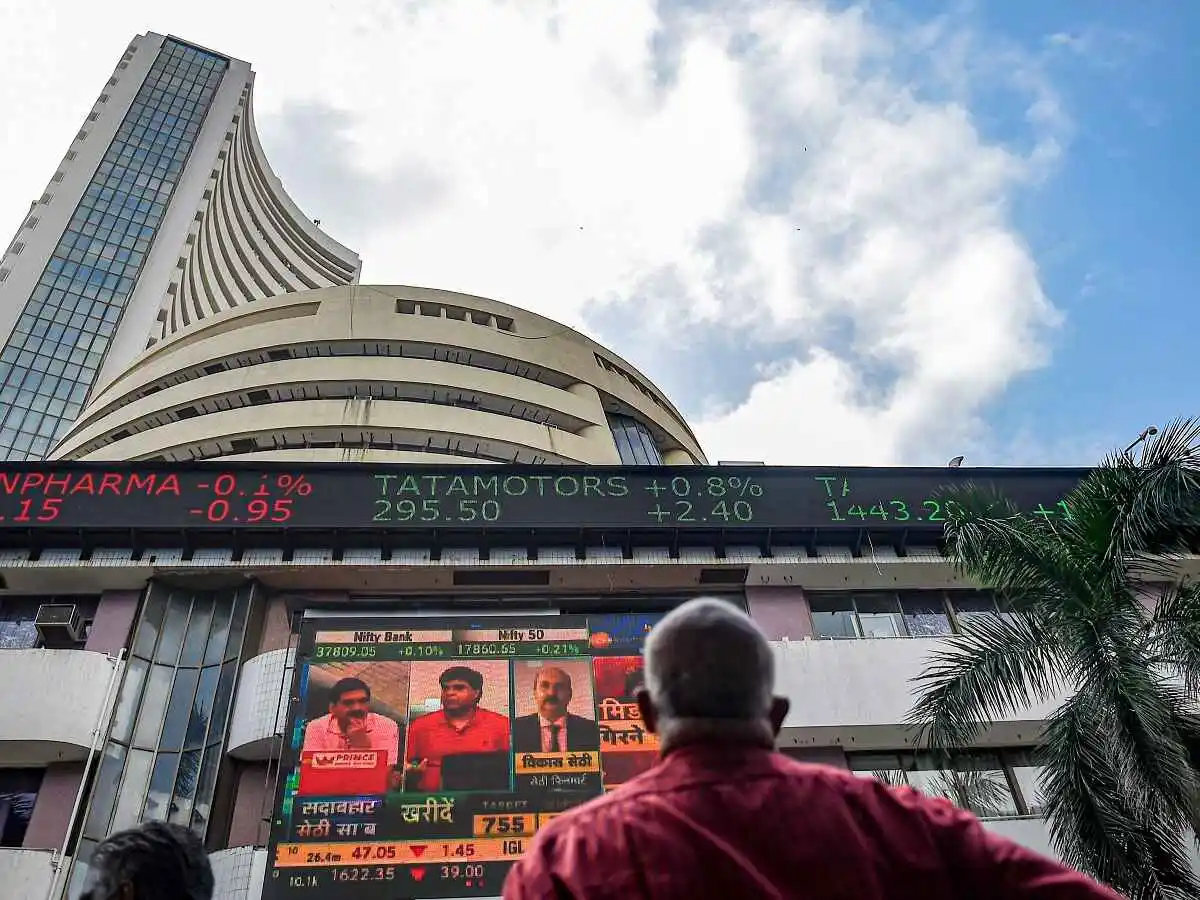Business News
Markets on edge: How India-Pakistan, Israel-Hamas, and Ukraine crises are driving uncertainty
.png)
5 min read | Updated on May 06, 2025, 17:56 IST
SUMMARY
Global markets are experiencing heightened volatility as geopolitical tensions escalate in three key regions: India-Pakistan, Israel-Gaza, and Ukraine-Russia.

30-share BSE Sensex declined 155.77 points or 0.19 per cent to settle at 80,641.07. (PTI)
Markets are navigating turbulent times as escalating tensions in three key geopolitical hotspots of India-Pakistan, Israel-Hamas, and Ukraine-Russia are keeping investors on toes.
On Tuesday, India’s benchmark indices, the BSE Sensex and NSE Nifty, closed lower in a range-bound trade due to profit booking and investors staying on the sidelines amid escalating tensions between India and Pakistan.
Snapping its two days of gains, the 30-share BSE Sensex declined 155.77 points or 0.19 per cent to settle at 80,641.07. During the day, it dropped 315.81 points or 0.39 per cent to 80,481.03.
The trifecta of conflicts threatens economic stability, trade flows, and global security.
Here’s a closer look at the developments driving uncertainty:
India-Pakistan tensions escalate
India and Pakistan are locked in a dangerous standoff following a deadly terror attack on April 22 in Pahalgam, which killed 26 civilians, mostly tourists.
Citing "cross-border linkages" to the April 22 attack, India has promised severe punishment to those involved in the strike.
New Delhi announced a raft of punitive measures against Pakistan, including suspending the Indus Waters Treaty, closing the Attari land border crossing, and downgrading diplomatic ties.
Pakistan retaliated by shutting its airspace to Indian airlines and halting all trade, including via third countries. Islamabad also declared India’s move to suspend the water treaty an “act of war.”
Prime Minister Narendra Modi has vowed to pursue the perpetrators “to the ends of the earth,” and has been holding a series of high-level meetings to weigh countermeasures.
Union Home Ministry has ordered states to conduct mock drills on May 7, including air raid siren tests and civilian defence training, signalling heightened preparedness for potential hostilities.
Moody’s Ratings warned Monday that sustained escalation would disproportionately harm Pakistan, potentially straining its foreign-exchange reserves and derailing its IMF-backed economic recovery.
Pakistan’s forex reserves remain fragile despite recent progress, and the IMF is set to evaluate a $1.3 billion climate resilience loan and an ongoing $7 billion bailout on May 9.
"In a scenario of sustained escalation in localised tensions, we do not expect major disruptions to India's economic activity because it has minimal economic relations with Pakistan. However, higher defence spending would potentially weigh on India's fiscal strength and slow its fiscal consolidation," Moody's said.
Moody’s rates Pakistan’s debt at “Caa2,” indicating high default risk, while India holds a “Baa3” investment-grade rating.
The standoff has kept investors on edge, contributing to the Sensex’s decline.
Israel’s Gaza plan stokes Middle East tensions
In the Middle East, Israel’s cabinet approved plans Monday to seize the Gaza Strip and maintain an indefinite presence, a move that could dramatically expand its military operations and deepen the humanitarian crisis.
The plan, which includes relocating hundreds of thousands of Palestinians to southern Gaza, has sparked fears of forced displacement and drawn international condemnation.
Implementation details remain unclear, but a defence official said the operation would not begin until after US President Donald Trump’s expected Middle East visit this month, leaving room for potential ceasefire talks with Hamas, reported The Associated Press.
Israel’s military also conducted airstrikes Monday on Houthi targets in Yemen’s Hodeida port in retaliation for a Houthi missile attack on Israel’s main airport.
The strikes followed Israel’s capture of roughly 50% of Gaza since ending a ceasefire with Hamas in mid-March.
The offensive has killed over 52,000 Palestinians, displaced 90% of Gaza’s population, and halted humanitarian aid, creating what the Palestinian Health Ministry calls the worst crisis in nearly 19 months of war.
The war, triggered by Hamas’ October 2023 attack that killed 1,200 Israelis and took 250 hostages, shows no sign of abating. Israel’s expansion plans, coupled with Trump’s controversial proposal for “voluntary emigration” of Gazans, have raised fears of prolonged conflict, further unsettling global markets.
Ukraine rejects Russia’s ceasefire offer
The ongoing Ukraine-Russia war also sees no sign of abating despite US President Donald Trump’s aggressive push for a peace deal between the two warring nations.
Ukrainian President Volodymyr Zelenskyy on Saturday rejected the Kremlin's offer for a three-day ceasefire to mark the 80th anniversary of Victory Day. “We cannot be responsible for what happens on the territory of the Russian Federation. They provide you with security, and therefore we will not give you any guarantees,” Zelenskyy was quoted as saying by RBC news portal.
He dismissed the offer as a “theatrical production,” insisting on a 30-day truce modelled on US proposals.
Warning foreign dignitaries attending Moscow’s Red Square parade, including Chinese President Xi Jinping and others, Zelenskyy said Kyiv cannot guarantee their safety in Russia.
Russia’s unilateral 72-hour ceasefire, declared Monday by President Vladimir Putin, will run from May 8 to May 10 to commemorate the defeat of Nazi Germany.
However, overnight Russian drone attacks on Kyiv wounded 11 people, including two children.
Ukraine’s air force intercepted 69 of 165 Russian drones and decoys, while Russia reported downing 13 Ukrainian drones.
The war, now in its third year, continues to disrupt global energy and commodity markets.
The confluence of these geopolitical crises has left markets jittery, with investors bracing for potential disruptions in trade, energy, and global growth.
About The Author
Next Story

